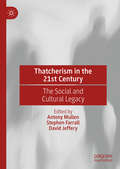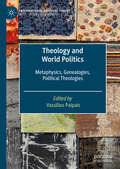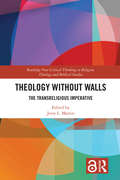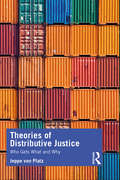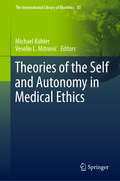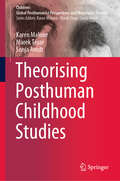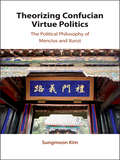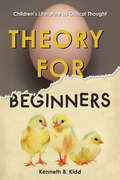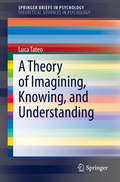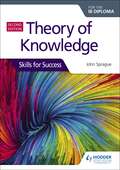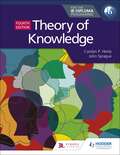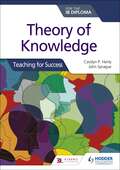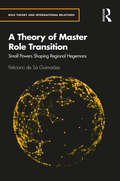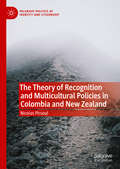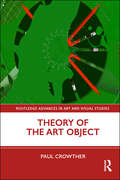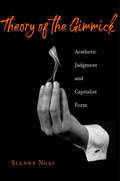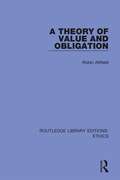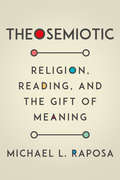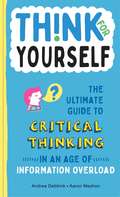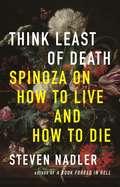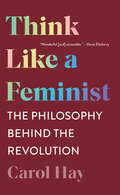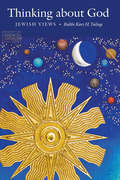- Table View
- List View
Thatcherism in the 21st Century: The Social and Cultural Legacy
by Stephen Farrall David Jeffery Antony MullenThis collection examines the social and cultural legacy of Thatcherism in the 21st century. Drawing upon perspectives from a range of disciplines, it considers how Thatcherism manifests itself today and how we can assess its long-term impact. The book is divided into four sections, which offer different ways of conceptualising and addressing questions of legacy: the ideological impact of Thatcherism on the Conservative Party and on the country; the long-term impact of Thatcherism across different parts of the UK; how Thatcherism has altered social attitudes to everything from welfare spending to Europe; and how popular historical accounts of Thatcherism have become embedded in different parts of contemporary British culture. The essays in this volume draw upon newly available archival materials, oral histories, social attitudes surveys and parliamentary debates to provide a well-rounded perspective on Thatcherism today.
Theology and World Politics: Metaphysics, Genealogies, Political Theologies (International Political Theory)
by Vassilios PaipaisSituated within the wider post-secular turn in politics and international relations, this volume focuses not on religion per se, but rather explicitly on theology. Contributions to this collection highlight the political theological foundations of international theory and world politics, recasting theology and politics as symbiotic discourses with all the risks, promises and open questions this relation may involve. The overarching claim the book makes is that all politics has theology embedded in it, both in the genealogical sense of carrying ineradicable traces of rival theological traditions, and also in the more ontological sense of being enacted by alternative configurations of the theologico-political. The book is unique in bringing together a diverse group of scholars, spanning knowledge areas as varied as IR, political theory, philosophy, theology, and history to investigate the complex interconnections between theology and world politics. It will be of interest to students and scholars of political theory, international relations, intellectual history, and political theology.
Theology Without Walls: The Transreligious Imperative (Routledge New Critical Thinking in Religion, Theology and Biblical Studies)
by Jerry L. MartinThinking about ultimate reality is becoming increasingly transreligious. This transreligious turn follows inevitably from the discovery of divine truths in multiple traditions. Global communications bring the full range of religious ideas and practices to anyone with access to the internet. Moreover, the growth of the "nones" and those who describe themselves as "spiritual but not religious" creates a pressing need for theological thinking not bound by prescribed doctrines and fixed rituals. This book responds to this vital need. The chapters in this volume each examine the claim that if the aim of theology is to know and articulate all we can about the divine reality, and if revelations, enlightenments, and insights into that reality are not limited to a single tradition, then what is called for is a theology without confessional restrictions. In other words, a Theology Without Walls. To ground the project in examples, the volume provides emerging models of transreligious inquiry. It also includes sympathetic critics who raise valid concerns that such a theology must face. This is a book that will be of urgent interest to theologians, religious studies scholars, and philosophers of religion. It will be especially suitable for those interested in comparative theology, inter-religious and interfaith understanding, new trends in constructive theology, normative religious studies, and global philosophy of religion.
Theories of Distributive Justice: Who Gets What and Why
by Jeppe PlatzHow should we design our economic systems? Should we tax the rich at a higher rate than the poor? Should we have a minimum wage? Should the state provide healthcare for all? These and many related questions are the subject of distributive justice, and different theories of distributive justice provide different ways to think about and answer such questions. This book provides a thorough introduction to the main theories of distributive justice and reveals the underlying sources of our disagreements about economic policy. It argues that the universe of theories of distributive justice is surprisingly simple, yet complicated. It is simple in that the main theories of distributive justice are just four in number, and in that these theories each offer a distinct, well-defined theoretical approach to distributive justice; yet it is complicated in that the main theories disagree at several distinct, fundamental levels, and in that it is possible to spin innumerable new theories from the elements of the four main theories. Key Features: Covers the four major theories of distributive justice and their leading philosophers, elucidating the attractions and drawbacks of each: Friedrich A. von Hayek and right-liberalism; John Rawls and left-liberalism; Robert Nozick and libertarianism; Gerald A. Cohen and socialism. Explains why these four theories have come to dominate most philosophical discussions on distributive justice, highlighting the essential answer provided in each that is lacking in other theories. Written for any reader interested in the topic, with an annotated reading list at the end of each chapter and helpful glossary at the back of the book.
Theories of the Self and Autonomy in Medical Ethics (The International Library of Bioethics #83)
by Michael Kühler Veselin L. MitrovićThis book engages in a critical discussion on how to respect and promote patients’ autonomy in difficult cases such as palliative care and end-of-life decisions. These cases pose specific epistemic, normative, and practical problems, and the book elucidates the connection between the practical implications of the theoretical debate on respecting autonomy, on the one hand, and specific questions and challenges that arise in medical practice, on the other hand. Given that the idea of personal autonomy includes the notion of authenticity as one of its core components, the book explicitly includes discussions on underlying theories of the self. In doing so, it brings together original contributions and novel insights for “applied” scenarios based on interdisciplinary collaboration between German and Serbian scholars from philosophy, sociology, and law. It is of benefit to anyone cherishing autonomy in medical ethics and medical practice.
Theorising Posthuman Childhood Studies (Children: Global Posthumanist Perspectives and Materialist Theories)
by Karen Malone Marek Tesar Sonja ArndtThis book is a genealogical foregrounding and performance of conceptions of children and their childhoods over time. We acknowledge that children’s lives are embedded in worlds both inside and outside of structured schooling or institutional settings, and that this relationality informs how we think about what it means to be a child living and experiencing childhood. The book maps the field by taking up a cross-disciplinary, genealogical niche to offer both an introduction to theoretical underpinnings of emerging theories and concepts, and to provide hands-on examples of how they might play out. This book positions children and their everyday lived childhoods in the Anthropocene and focuses on the interface of children’s being in the everyday spaces and places of contemporary communities and societies. In particular this book examines how the shift towards posthuman and new materialist perspectives continues to challenge dominant developmental, social constructivist and structuralist theoretical approaches in diverse ways, to help us to understand contemporary constructions of childhoods. It recognises that while such dominant approaches have long been shown to limit the complexity of what it means to be a child living in the contemporary world, the traditions of many Eurocentric theories have not addressed the diversity of children’s lives in the majority of countries or in the Global South.
Theorizing Confucian Virtue Politics: The Political Philosophy of Mencius and Xunzi
by Sungmoon KimSurprisingly little is known about what ancient Confucian thinkers struggled with in their own social and political contexts and how these struggles contributed to the establishment and further development of classical Confucian political theory. Leading scholar of comparative political theory, Sungmoon Kim offers a systematic philosophical account of the political theories of Mencius and Xunzi, investigating both their agreements and disagreements as the champions of the Confucian Way against the backdrop of the prevailing realpolitik of the late Warring States period. Together, they contributed to the formation of Confucian virtue politics, in which concerns about political order and stability and concerns about moral character and moral enhancement are deeply intertwined. By presenting their political philosophies in terms of constitutionalism, Kim shows how they each developed the ability to authorize the ruler's legitimate use of power in domestic and interstate politics in ways consistent with their distinctive accounts of human nature.
Theory for Beginners: Children’s Literature as Critical Thought
by Kenneth B. KiddSince its inception in the 1970s, the Philosophy for Children movement (P4C) has affirmed children’s literature as important philosophical work. Theory, meanwhile, has invested in children’s classics, especially Lewis Carroll’s Alice books, and has also developed a literature for beginners that resembles children’s literature in significant ways. Offering a novel take on this phenomenon, Theory for Beginners explores how philosophy and theory draw on children’s literature and have even come to resemble it in their strategies for cultivating the child and/or the beginner. Examining everything from the rise of French Theory in the United States to the crucial pedagogies offered in children’s picture books, from Alison Bechdel’s graphic memoir Are You My Mother? and Lemony Snicket’s A Series of Unfortunate Events to studies of queer childhood, Kenneth B. Kidd deftly reveals the way in which children may learn from philosophy and vice versa.
A Theory of Imagining, Knowing, and Understanding (SpringerBriefs in Psychology)
by Luca TateoThis is a book about imaginative work and its relationship with the construction of knowledge. It is fully acknowledged by epistemologists that imagination is not something opposed to rationality; it is not mere fantasy opposed to intellect. In philosophy and cognitive sciences, imagination is generally “delimiting not much more than the mental ability to interact cognitively with things that are not now present via the senses.” (Stuart, 2017, p. 11) For centuries, scholars and poets have wondered where this capability could come from, whether it is inspired by divinity or it is a peculiar feature of human mind (Tateo, 2017b). The omnipresence of imaginative work in both every day and highly specialized human activities requires a profoundly radical understanding of this phenomenon. We need to work imaginatively in order to achieve knowledge, thus imagination must be something more than a mere flight of fantasy. Considering different stories in the field of scientific endeavor, I will try to propose the idea that the imaginative process is fundamental higher mental function that concurs in our experiencing, knowing and understanding the world we are part of. This book is thus about a theoretical idea of imagining as constant part of the complex whole we call the human psyche. It is a story of human beings striving not only for knowledge and exploration but also striving for imagining possibilities.
Theory of Knowledge for the IB Diploma: Skills for Success
by John SpragueBuild confidence in a range of key Theory of Knowledge skills with this practical companion, full of advice and guidance from an experienced TOK expert.- Learn to apply analytical skills with Deeper Thinking, showing you how to go beyond simply identifying and explaining.- Develop awareness of the practical application of knowledge with In Practice pointers, offering guidance on how topics can be used in TOK activities.- Improve your ability to respond to knowledge questions, a crucial part of assessment success.- Avoid making the mistakes that others make in the assessments with TOK Traps that highlight common errors and misconceptions.Also available:Theory of Knowledge for the IB Diploma 9781510474314Theory of Knowledge Student eTextbook 9781510475458Theory of Knowledge Whiteboard eTextbook 9781510475441Theory of Knowledge: Teaching for Success 9781510474659Theory of Knowledge: Skills for Success Student eTextbook 9781510475472
Theory of Knowledge for the IB Diploma Fourth Edition
by Carolyn P. Henly John SpragueDeveloped in cooperation with the International Baccalaureate (IB)Build knowledge with this thought-provoking guide through the core theme, the five optional themes and the five areas of knowledge.- Guide students by helping them examine the nature of knowledge and their own status as a knower.- Develop diverse and balanced arguments with a variety of activities, case studies and Deeper Thinking features.- Aid understanding with in-depth discussions of the twelve course concepts and detailed definitions of all key terms.- Provide assessment support with guidance relating to the TOK Exhibition and Essay.Free online material available at hoddereducation.com/ib-extrasAlso available:Theory of Knowledge Student eTextbook 9781510475458Theory of Knowledge Whiteboard eTextbook 9781510475441Theory of Knowledge: Teaching for Success 9781510474659Theory of Knowledge: Skills for Success 9781510474956Theory of Knowledge: Skills for Success Student eTextbook 9781510475472
Theory of Knowledge for the IB Diploma Fourth Edition
by Carolyn P. Henly John SpragueDeveloped in cooperation with the International Baccalaureate (IB)Build knowledge with this thought-provoking guide through the core theme, the five optional themes and the five areas of knowledge.- Guide students by helping them examine the nature of knowledge and their own status as a knower.- Develop diverse and balanced arguments with a variety of activities, case studies and Deeper Thinking features.- Aid understanding with in-depth discussions of the twelve course concepts and detailed definitions of all key terms.- Provide assessment support with guidance relating to the TOK Exhibition and Essay.Free online material available at hoddereducation.com/ib-extrasAlso available:Theory of Knowledge Student eTextbook 9781510475458Theory of Knowledge Whiteboard eTextbook 9781510475441Theory of Knowledge: Teaching for Success 9781510474659Theory of Knowledge: Skills for Success 9781510474956Theory of Knowledge: Skills for Success Student eTextbook 9781510475472
Theory of Knowledge for the IB Diploma: Skills for Success
by John SpragueBuild confidence in a range of key Theory of Knowledge skills with this practical companion, full of advice and guidance from an experienced TOK expert.- Learn to apply analytical skills with Deeper Thinking, showing you how to go beyond simply identifying and explaining.- Develop awareness of the practical application of knowledge with In Practice pointers, offering guidance on how topics can be used in TOK activities.- Improve your ability to respond to knowledge questions, a crucial part of assessment success.- Avoid making the mistakes that others make in the assessments with TOK Traps that highlight common errors and misconceptions.Also available:Theory of Knowledge for the IB Diploma 9781510474314Theory of Knowledge Student eTextbook 9781510475458Theory of Knowledge Whiteboard eTextbook 9781510475441Theory of Knowledge: Teaching for Success 9781510474659Theory of Knowledge: Skills for Success Student eTextbook 9781510475472
Theory of Knowledge for the IB Diploma: Teaching for Success
by Carolyn P. Henly John SpragueConfidently navigate the new syllabus with a variety of teaching resources to help you plan engaging lessons that are directly aligned with the Student Book.- Confidently teach the new course with a clear overview of the TOK course and your responsibilities as a TOK teacher.- Ensure full coverage of the syllabus with specific guidance relating to the core theme, the optional themes and the areas of knowledge.- Easily navigate the new course with lesson plans, activities and extension material.- Help guide students through the assessment process with advice relating to the exhibition and essay.
Theory of Knowledge for the IB Diploma: Teaching for Success
by Carolyn P. Henly John SpragueConfidently navigate the new syllabus with a variety of teaching resources to help you plan engaging lessons that are directly aligned with the Student Book.- Confidently teach the new course with a clear overview of the TOK course and your responsibilities as a TOK teacher.- Ensure full coverage of the syllabus with specific guidance relating to the core theme, the optional themes and the areas of knowledge.- Easily navigate the new course with lesson plans, activities and extension material.- Help guide students through the assessment process with advice relating to the exhibition and essay.
A Theory of Master Role Transition: Small Powers Shaping Regional Hegemons (Role Theory and International Relations)
by Feliciano de Sá GuimarãesIn this book, Feliciano de Sá Guimarães offers an original application of Role Theory. He proposes a theory of master role transitions to explain how small powers can change regional powers’ master roles without changing the regional material power distribution.Master role transition is the replacement of an active dominant master role by a dormant or inactive role located within one’s role repertoire. Guimarães argues that only a combination of four necessary conditions can produce a full master role transition: asymmetrical material interdependence, altercasting, domestic contestation and regional contestation. In each one of these conditions, a small power uses material and ideational tools to promote a master role transition within the regional power role repertoire. To test his model, Guimarães turns to five case studies in Latin America, Southern Africa and South Asia: the 2006–2007 Bolivia–Brazil gas crisis, the 2008–2009 Paraguay–Brazil Itaipú Dam crisis, the 2008–2009 Ecuador–Brazil Odebrecht crisis, the 1998 South Africa–Lesotho military intervention crisis and the 1996India–Bangladesh Ganges water crisis.A Theory of Master Role Transition is an excellent resource for those studying both theory and method in International Relations and foreign policy analysis.
The Theory of Recognition and Multicultural Policies in Colombia and New Zealand (Palgrave Politics of Identity and Citizenship Series)
by Nicolas PirsoulThis book analyses the policies of recognition that were developed and implemented to improve the autonomy and socio-economic well-being of Māori in New Zealand and of indigenous and Afro-descendent people in Colombia. It offers a theoretically informed explanation of the reasons why these policies have not yielded the expected results, and offers solutions to mitigate the shortcomings of policies of recognition in both countries. This in-depth analysis enables readers to develop their understanding of the theory of recognition and how it can promote social justice.
Theory of the Art Object (Routledge Advances in Art and Visual Studies)
by Paul CrowtherMeaning in the visual arts centers on how the physical work makes its content or presence visible. The art object is fundamental. Indeed, the different object forms of each visual medium allows our experience of space-time, and our relations to other people, to be aesthetically embodied in unique ways. Through these embodiments, visual art compensates for what is otherwise existentially lost, and becomes part of what makes life worth living. The present book shows this by discussing a range of visual art forms, namely pictorial representation, abstraction, sculpture and assemblage works, land art, architecture, photography, and varieties of digital art.
Theory of the Gimmick: Aesthetic Judgment and Capitalist Form
by Sianne NgaiA provocative theory of the gimmick as an aesthetic category steeped in the anxieties of capitalism. Repulsive and yet strangely attractive, the gimmick is a form that can be found virtually everywhere in capitalism. It comes in many guises: a musical hook, a financial strategy, a striptease, a novel of ideas. Above all, acclaimed theorist Sianne Ngai argues, the gimmick strikes us both as working too little (a labor-saving trick) and as working too hard (a strained effort to get our attention). Focusing on this connection to work, Ngai draws a line from gimmicks to political economy. When we call something a gimmick, we are registering uncertainties about value bound to labor and time—misgivings that indicate broader anxieties about the measurement of wealth in capitalism. With wit and critical precision, Ngai explores the extravagantly impoverished gimmick across a range of examples: the fiction of Thomas Mann, Helen DeWitt, and Henry James; photographs by Torbjørn Rødland; the video art of Stan Douglas; the theoretical writings of Stanley Cavell and Theodor Adorno. Despite its status as cheap and compromised, the gimmick emerges as a surprisingly powerful tool in this formidable contribution to aesthetic theory.
A Theory of Value and Obligation
by Robin AttfieldOriginally published in 1987 and re-issued in 2020 with a new Preface, this book presents and elaborates interrelated solutions to a number of problems in moral philosophy, from the location of intrinsic value and the nature of a worthwhile life, via the limits of obligation and the nature of justice, to the status of moral utterances. After developing a biocentric account of moral standing, the author locates worthwhile life in the development of the generic capacities of a creature, whether human or nonhuman, and presents an account of relative intrinsic value which later generates a theory of interspecific justice. This value-theory also informs a consequentialist understanding of obligation, of moral rightness and of supererogation. The understanding thus supplied is shown to cope with the problems of integrity, of justice and of the ‘Repugnant Conclusion’ in population ethics. A cognitivist account of ethical conclusions such as those so far reached is then defended against non-cognitivist and relativist objections and a far-reaching naturalist theory is defended, integrating earlier conclusions with an account of the logic of the fundamental ethical concepts. This wide-ranging volume which maps the whole area of morality is thoroughly argued with reference both to contemporary philosophical developments and to classical theories.
Theosemiotic: Religion, Reading, and the Gift of Meaning
by Michael L. RaposaIn Theosemiotic, Michael Raposa uses Charles Peirce’s semiotic theory to rethink certain issues in contemporary philosophical theology and the philosophy of religion. He first sketches a history that links Peirce’s thought to that of earlier figures (both within the tradition of American religious thought and beyond), as well as to other classical pragmatists and to later thinkers and developments. Drawing on Peirce’s ideas, Raposa develops a semiotic conception of persons/selves emphasizing the role that acts of attention play in shaping human inferences and perception. His central Peircean presuppositions are that all human experience takes the form of semiosis and that the universe is “perfused” with signs. Religious meaning emerges out of a process of continuously reading and rereading certain signs. Theology is explored here in its manifestations as inquiry, therapy, and praxis. By drawing on both Peirce’s logic of vagueness and his logic of relations, Raposa makes sense out of how we talk about God as personal, and also how we understand the character of genuine communities. An investigation of what Peirce meant by “musement” illuminates the nature and purpose of prayer. Theosemiotic is portrayed as a form of religious naturalism, broadly conceived. At the same time, the potential links between any philosophical theology conceived as theosemiotic and liberation theology are exposed.
Think for Yourself: The Ultimate Guide to Critical Thinking in an Age of Information Overload
by Andrea DebbinkMiddle school is a time of change, when things begin to look different and assumptions start to be questioned, and today more than ever it’s tough to know what to believe. This unique and timely book won&’t tell you what to think—that’s up to you!—but it will show you how to think more deeply about your own life and current events. Covering a wide range of subjects affecting the world today, including human and animal rights, social media, cyber bullying, the refugee crisis, and more, THINK FOR YOURSELF will help you to learn how to ask questions, analyze evidence, and use logic to draw conclusions, so you can solve problems and make smart decisions. Each chapter of the book covers one key step in the critical thinking process, and includes a real-world example to help convey the importance and relevance of every step: <P><P>Ask Questions: If you want to be a critical thinker, it helps to be curious. It’s normal to wonder about the world around us. Some questions are big, and some are small. Sometimes questions can spark debate and argument. All critical thinking starts with at least one question. <P><P> Gather Evidence: First, find information—from making observations to interviewing experts to researching a topic online or in books. Then make connections and draw conclusions. <P><P>Evaluating Evidence: Smart thinkers evaluate the importance, accuracy and relevancy of the information they gather. <P><P>Getting Curious: Consider other points of view, examine your own point of view, understand the power of emotion, and practice empathy. <P><P>Draw Conclusions: The final step in the critical thinking process, this is based on reason and evidence. Revisit your original question, review the evidence and what you’ve learned, and consider your values. And remember: critical thinking doesn’t stop when you’ve reached a decision. Learn how to discuss and debate other points of view. Then keep growing. Sometimes you might change your mind—that’s OK, too! Featuring profiles of real-life inspiring young critical thinkers from around the world, checklists, quizzes, and activities, THINK FOR YOURSELF is a clever and fun illustrated guide that teaches middle schoolers that even young people can make a difference in the world just by thinking smart and understanding. <P><P>INCLUDES:Your Turn: activities to help connect ideas to readers’ lives <P><P>Quizzes <P><P>Profiles of inspiring young critical thinkers <P><P>A Reading List for Young Thinkers <P><P>Teacher's guides <P><P>Plus a table of contents, index, and glossary for easy searching
Think Least of Death: Spinoza on How to Live and How to Die
by Steven NadlerFrom Pulitzer Prize-finalist Steven Nadler, an engaging guide to what Spinoza can teach us about life’s big questionsIn 1656, after being excommunicated from Amsterdam’s Portuguese-Jewish community for “abominable heresies” and “monstrous deeds,” the young Baruch Spinoza abandoned his family’s import business to dedicate his life to philosophy. He quickly became notorious across Europe for his views on God, the Bible, and miracles, as well as for his uncompromising defense of free thought. Yet the radicalism of Spinoza’s views has long obscured that his primary reason for turning to philosophy was to answer one of humanity’s most urgent questions: How can we lead a good life and enjoy happiness in a world without a providential God? In Think Least of Death, Pulitzer Prize–finalist Steven Nadler connects Spinoza’s ideas with his life and times to offer a compelling account of how the philosopher can provide a guide to living one’s best life.In the Ethics, Spinoza presents his vision of the ideal human being, the “free person” who, motivated by reason, lives a life of joy devoted to what is most important—improving oneself and others. Untroubled by passions such as hate, greed, and envy, free people treat others with benevolence, justice, and charity. Focusing on the rewards of goodness, they enjoy the pleasures of this world, but in moderation. “The free person thinks least of all of death,” Spinoza writes, “and his wisdom is a meditation not on death but on life."An unmatched introduction to Spinoza’s moral philosophy, Think Least of Death shows how his ideas still provide valuable insights about how to live today.
Think Like a Feminist: The Philosophy Behind The Revolution
by Carol HayAn audacious and accessible guide to feminist philosophy—its origins, its key ideas, and its latest directions. Think Like a Feminist is an irreverent yet rigorous primer that unpacks over two hundred years of feminist thought. In a time when the word feminism triggers all sorts of responses, many of them conflicting and misinformed, Professor Carol Hay provides this balanced, clarifying, and inspiring examination of what it truly means to be a feminist today. She takes the reader from conceptual questions of sex, gender, intersectionality, and oppression to the practicalities of talking to children, navigating consent, and fighting for adequate space on public transit, without deviating from her clear, accessible, conversational tone. Think Like a Feminist is equally a feminist starter kit and an advanced refresher course, connecting longstanding controversies to today’s headlines. Think Like a Feminist takes on many of the essential questions that feminism has risen up to answer: Is it nature or nurture that’s responsible for our gender roles and identities? How is sexism connected to racism, classism, homophobia, transphobia, and other forms of oppression? Who counts as a woman, and who gets to decide? Why have men gotten away with rape and other forms of sexual violence for so long? What responsibility do women themselves bear for maintaining sexism? What, if anything, can we do to make society respond to women’s needs and desires? Ferocious, insightful, practical, and unapologetically opinionated, Think Like a Feminist is the perfect book for anyone who wants to understand the continuing effects of misogyny in society. By exploring the philosophy underlying the feminist movement, Carol Hay brings today’s feminism into focus, so we can deliberately shape the feminist future.
Thinking about God: Jewish Views (JPS Essential Judaism)
by Rabbi Kari H. TulingWho—or what—is God? Is God like a person? Does God have a gender? Does God have a special relationship with the Jewish people? Does God intervene in our lives? Is God good—and, if yes, why does evil persist in the world? In investigating how Jewish thinkers have approached these and other questions, Rabbi Kari H. Tuling elucidates many compelling—and contrasting—ways of thinking about God in Jewish tradition.Thinking about God addresses the genuinely intertextual nature of evolving Jewish God concepts. Just as in Jewish thought the Bible and other historical texts are living documents, still present and relevant to the conversation unfolding now, and just as a Jewish theologian examining a core concept responds to the full tapestry of Jewish thought on the subject all at once, this book is organized topically, covers Jewish sources (including liturgy) from the biblical to the postmodern era, and highlights the interplay between texts over time, up through our own era. A highly accessible resource for introductory students, Thinking about God also makes important yet challenging theological texts understandable. By breaking down each selected text into its core components, Tuling helps the reader absorb it both on its own terms and in the context of essential theological questions of the ages. Readers of all backgrounds will discover new ways to contemplate God. Access a study guide.
